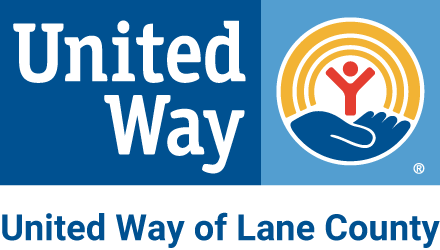Boosting Literacy for Long-Term Student Success: BookFest
BookFest volunteer and students selecting which books to take home.
Studies show 53% of Lane County students lack essential reading skills by the time they reach third grade. (1). Surprised? Well, hold on tight because this problem has more long-term negative impacts than most people realize. Studies show that children are four times more likely to drop out of high school if they aren’t reading at grade level by the end of third grade (2). Moreover, low academic achievement as early as fourth grade can be a powerful predictor of graduation rates in high school and college, as well as lifetime earnings (3). That’s why United Way of Lane County is turning its focus to elementary school success and working to rewrite this story for Lane County kids. One such effort, BookFest, is a collaboration between United Way of Lane County, the Lane Early Learning Alliance and Connected Lane County, and is widely supported by numerous donors, volunteers, sponsors and United Way’s Emerging Leaders group and takes place in April and May each year.
Getting books into students’ hands and homes
BookFest is all about getting kids engaged in reading before they reach that critical third grade benchmark. “Third grade is the point at which we hope students are no longer learning to read, but they're reading to learn,” says Heidi Larwick, the director at Connected Lane County. To achieve its goal of boosting literacy, the program has four core areas of focus: access, book ownership, choice and quantity.
“One of the main goals was to make sure [students] had books in their home and to get them reading over the summer, which is a time when we tend to see some regression,” says Tawnee Lovell, learning specialist and TOSA (Teacher on Special Assignment) at Guy Lee Elementary School. Access to books in students’ homes is critical for preventing what is commonly known as “summer slide,” the tendency for skills learned during the school year to degrade over the summer when students aren’t in school. BookFest provides students with reading opportunities even when school is not in session and despite financial barriers that may prevent them from having books in the home.
Student choice in selecting their own reading material is also a critical component. Children are far more likely to get excited about reading if they are allowed the opportunity to choose books aligned with their interests. And it can’t be a “one and done” experience; with more opportunities for students to engage positively with reading — having variety in their reading and several books to read, for example — reading habits can be better established. BookFest allows students to self-select six books to take home with them.
It takes a village: a true community collaboration
In 2018, over 6,000 books and $1,500 in donations were generated by the program through community book drives and sponsorships. This made it possible for 918 kindergarten, first and second graders from eight Lane County Title I schools to participate in BookFest and take home a total of 5,478 books! One group responsible for generating thousands of book donations, sorting and packaging books, delivering them to schools and volunteering at BookFest events is United Way of Lane County’s Emerging Leaders group.
Emerging Leaders sorting and cleaning books during 2018 BookFest.
“Emerging Leaders is like a networking group, but it's more focused on learning about areas of need in the community and getting out there and volunteering,” says member Theresa Maurer, an associate at Pivot Architecture in Eugene. The group participates in community events to learn about and address some of the biggest issues in Lane County, and volunteers in several annual initiatives including BookFest. “Participating in BookFest is a fun thing to do, but it’s also rewarding to know where the books are going,” says Maurer. “It taps into one of United Way's main goals around early reading proficiency and is a nice way to get young professionals involved.”
The concept of BookFest — getting more books into students’ hands and homes — is simple, but it’s easier said than done. It requires collecting books, sorting them, disseminating them among schools, guiding students to age- and interest-appropriate selections, and more. Administering an effort of this size is quite complex. BookFest’s success would not be possible without the collective efforts of United Way’s partner organizations, the Lane Early Learning Alliance and Connected Lane County, as well as schools, sponsors and donors, the Emerging Leader group and community volunteers. “BookFest was fantastic and we are very grateful to be a part of it,” says Lovell. “It was such a wonderful opportunity for our students and we really appreciate [the effort]. The volunteers I worked with were amazing.”
Supporting educators and closing achievement gaps
BookFest 2018 was a rousing success and will continue in 2019 with the same eight schools in an effort to continue to boost literacy among all students and close achievement gaps experienced by students who come from underprivileged backgrounds. “I took this job when my daughter was in kindergarten and it was the first time that I was really faced with seeing the discrepancies and inequities in schools, so I really appreciate having an opportunity to be part of a program that helps overcome those inequities,” says Larwick.
Want to get involved?
Check back in February of 2020 for more details about sponsoring, volunteering, or hosting book drives, or email volunteer@unitedwaylane.org.
References:
(1) Oregon Department of Education (https://www.oregon.gov/ode/educator-resources/assessment/Pages/English-Language-Arts.aspx)
(2) Donald J. Hernandez, Double Jeopardy: How Third-Grade Reading Skills and Poverty Influence High School Graduation. The Annie E. Casey Foundation; Center (http://ferstreaders.org/resources/fifty-top-literacy-statistics)
(3) McKinsey & Company (April 2009). The Economic Impact of the Achievement Gap in America’s schools. Washington, D.C. (http://ferstreaders.org/resources/fifty-top-literacy-statistics)



